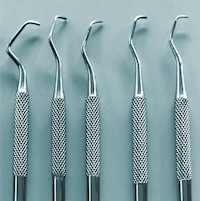|

Preparation
 Prospective dental hygienists must become licensed in the state in which
they wish to practice. A degree from an accredited dental hygiene school is
usually required along with licensure examinations. Prospective dental hygienists must become licensed in the state in which
they wish to practice. A degree from an accredited dental hygiene school is
usually required along with licensure examinations.
A high school diploma and college entrance test scores are
usually required for admission to a dental hygiene program. High school
students interested in becoming a dental hygienist should take courses in
biology, chemistry, and mathematics. Also, some dental hygiene programs
require applicants to have completed at least 1 year of college. Specific
entrance requirements vary from one school to another.
 Licensure Licensure
Dental hygienists must be licensed by the state in which
they practice. Nearly all States require candidates to graduate from an
accredited dental hygiene school and pass both a written and clinical
examination. The American Dental Association's Joint Commission on National
Dental Examinations administers the written examination, which is accepted
by all states and the District of Columbia. State or regional testing
agencies administer the clinical examination. In addition, most States
require an examination on the legal aspects of dental hygiene practice.
Alabama is the only state that allows candidates to take its examinations
if they have been trained through a State-regulated on-the-job program in a
dentist's office.
 Accredited
Programs Accredited
Programs
The American
Dental Association's Commission on Dental Accreditation is the
nationally recognized accrediting authority for dental education
accreditation. There are about 300 dental hygiene programs currently
accredited. Most dental hygiene programs grant an associate degree,
although some also offer a certificate, a bachelor's degree, or a master's
degree. A minimum of an associate degree or certificate in dental hygiene
is generally required for practice in a private dental office, so working
toward an associate degree is recommended over a certificate program. A
bachelor's or master's degree usually is required for research, teaching,
or clinical practice in public or school health programs.
Schools offer laboratory, clinical, and classroom
instruction in subjects such as anatomy, physiology, chemistry,
microbiology, pharmacology, nutrition, radiography, histology (the study of
tissue structure), periodontology (the study of gum diseases), pathology,
dental materials, clinical dental hygiene, and social and behavioral sciences.
Be sure to double check with the American
Dental Association's Commission on Dental Accreditation for a current
list of accredited programs.
Note: Some resources in this section are provided by the US
Department of Labor, Bureau of Labor
Statistics.
|
|